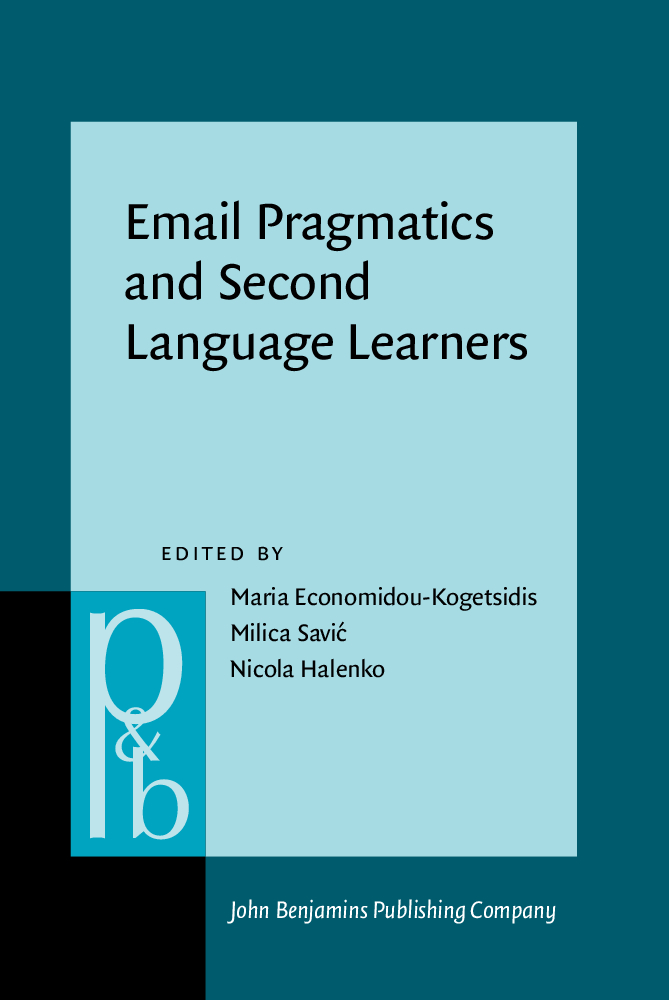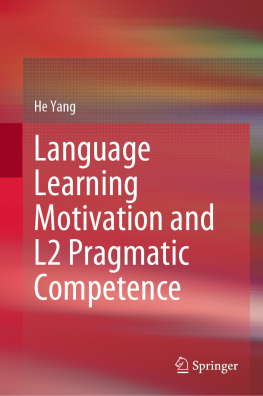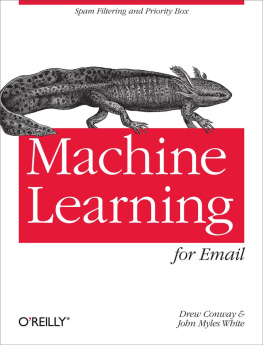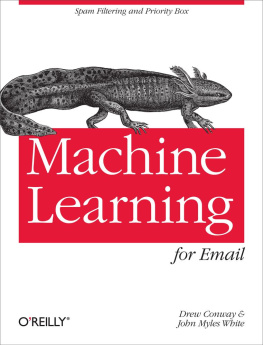

Email Pragmatics and Second Language Learners
Maria Economidou-Kogetsidis , Milica Savi & Nicola Halenko
doi: 10.1075/pbns.328
ISBN: 978 90 272 5846 5 (ebook)
Cataloging-in-Publication Data available from Library of Congress:
LCCN 2021037703
2021 John Benjamins Publishing Company
John Benjamins Publishing Company https://benjamins.com
Acknowledgements
As editors we would like to thank the two anonymous external reviewers for their time, comments and thoughtful suggestions on the submitted version of this volume. We would also like to thank all the authors for accepting our invitation to contribute to this book and for their dedication, patience and professionalism, especially when it came to meeting all our deadlines in a timely manner. Our appreciation also goes to Anita Fetzer, the editor of Pragmatics and Beyond New Series, for taking on the volume and for her guidance and help. Special thanks go to Isja Conen, Senior Acquisitions Editor at John Benjamins Publishing, for her constant support throughout the entire process without which this project would not have been possible. Finally, on behalf of our contributors, we would like to offer our thanks to all the research participants and email writers of the empirical studies included in this volume. Without them, none of the studies would have been feasible.
Second language email pragmatics Introduction
Nicola Halenko , Milica Savi & Maria Economidou-Kogetsidis University of Central Lancashire | University of Stavanger | University of Nicosia
In the past two decades, email communication has been studied extensively from a number of perspectives. Linguistically focused studies of emails have transitioned from attempts to identify and describe a unified grammar of email (). This change of perspective, reflecting a view of email communication as dynamic and open for negotiation and co-construction in any given context, has opened a number of research avenues, many of which are still not thoroughly explored.
Email is currently the oldest mode of computer-mediated communication. It is one of the most popular communication media given its high transmission speed and its less intrusive nature compared to other modes of CMC. Unlike instant messages, which are often the preferred medium for private correspondence and are more about contact than content, email appears to support longer distance relationships and it is used more for information purposes ( for a volume dedicated to Email discourse among Chinese using English as a Lingua Franca). The present volume is therefore dedicated to furthering the study of the growing field of L2 email communication research and addresses a range of topics that have so far received comparatively scant attention. It broadly aims to take the reader from a consideration of L2 learners perceptions of the email medium (Ren and Liu), over pragmatic development as reflected in email writing (Chen and Liu; Halenko and Winder; Nguyen and Pham; Us-Juan), to relational practices in emails in a variety of academic contexts (Bella; Economidou-Kogetsidis; Savi and orevi; Schauer).
Email writing is challenging for L2 learners on a number of levels. One of the main issues is how to express their intended meaning through a language they may not have mastered fully. Learners may encounter difficulties both when choosing appropriate L2 linguistic resources to express their communicative intent and when attempting to adjust the linguistic resources they have in their repertoire to specific contextual demands. On the one hand, empirical research has shown inappropriate choices regarding either communicative intent or linguistic resources can result in negative evaluations of the email senders personality () and a lack of (meaningful) focus on email writing in EFL textbooks, learners are often left to rely on guesswork to work the pragmatics out for themselves.
L2 users (sometimes inappropriate) choices regarding their email discourse may stem from sources other than limited L2 proficiency, and may include transfer from L1, as well as various forms of agency, such as a choice not to conform to perceived L2 norms, or an attempt to position themselves or construct their identity through the use of L2. The influence of the instant messaging culture of the Millennial Generation (; Chen and Liu present volume; Halenko and Winder present volume; Nguyen and Pham present volume; Us-Juan present volume).
The subtle interplay between language development and identity construction (), and the identity they want to construct in communication. Identity construction by L1 and L2 users of Greek in academic communication and their entitlement to perform a request and negotiate their relationship with their lecturers is explored in this volume by Bella, who opens up relevant future research directions focusing on L2 users perceived entitlement, rights and obligations, as well as issues of ideology and power in academic communication.
Against the backdrop of the challenges and choices faced by L2 learners and their email practices, the current volume presents a series of empirical studies offering new insights into this growing research field and offers new or extended avenues of email research. The first part of the volume deals with learners email literacy and pragmatic development in their email writing based on elicited (Chen and Liu; Nguyen and Pham; Us-Juan) or naturally-occurring data (Halenko and Winder). It includes cross-sectional (Nguyen and Pham), longitudinal (Halenko and Winder) as well as developmental studies that examine the affordances of pragmatic instruction (Chen and Liu; Us-Juan). The studies in the second part of the volume deal with relational practices in email communication in relation mainly to email production, and analyse elicited (Ren and Liu) or natural data (Bella; Economidou-Kogetsidis; Savi and orevi; Schauer) across a range of academic contexts. The section below offers a brief overview and highlights the unique contribution of each of the chapters in the volume.
Volume Part I : Email literacy and pragmatic development
Whilst a considerable body of research exists on spoken pragmatic data, we know much less about pragmatic development and literacy in email interaction. Since academic institutions now largely rely on email as the main source for disseminating information to students, the research community is now playing catch up to understand the intricacies of staff-student communication via this medium. The studies in the first part of the volume aim to contribute to this knowledge gap.
In the first chapter, Chen and Liu explore the affordances of reformulations of learner emails and native speaker models for fostering L2 learners email literacy. Designed within the framework of sociocultural theory, this study focuses on two high-intermediate EFL learners collaborative work on email writing and analysis tasks, followed by an individual email writing task. Overall, the study reveals positive results of this three-stage writing process. The discussions during collaborative writing were found to contribute to a successful resolution of pragmatics-related episodes. While individually written emails incorporated many features of the reformulation and native speaker model noticed during the collaborative task analysis, the reformulation seemed to have influenced individual emails more substantially than the native speaker model. Chen and Lius chapter contributes to instructional pragmatics and their studys unique contribution is the emphasis on task-based language learning and the importance of noticing within email literacy development, and hence in L2 pragmatic development more generally.













